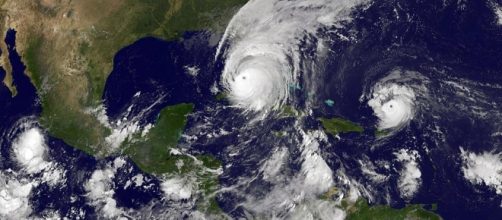For Americans, The Atlantic Hurricane Season usually brings haunting reminders of Hurricanes' Galveston (1900), Andrew (1992), and Katrina (2005); all three caused destruction so great that the infrastructure of entire cities was wiped out.
Climate Change and Migration
The 2017 hurricane season has brought new reminders of devastation, and new names to blame; Harvey, Irma, and Maria have made clear that the United States is still not invincible to climate change. The military can compete with mother nature by rescuing survivors and strategically getting resources to hard-to-reach areas, but the battlefield is still uneven and vulnerable to future attacks.
Donations of food and money, while desperately needed (please visit globalgiving.org) are only short-term solutions to a long-term problem.
The devastation of a changing climate which renders millions without income, food, or shelter can appear quietly. In contrast to metres of flooding left by a hurricane, a lack of rain can be equally as lethal. Droughts spark economic and food insecurity in regions dependent upon arable land.
For many people, waiting is not an option; migration is key to survival. Those who are fleeing their homes due to these circumstances must either migrate or starve. To date, over 21.5 million people have been displaced due to climate change.
The migration debate: questions of sovereignty
As the area of habitable land decreases across Earth, the principle of sovereignty will be in direct contention with ethical questions, namely: To what extent do states have an obligation to accept those displaced by climate change? Are climate change migrants entitled to benefits as refugees who are unable to return home? The migration debate is hot with discussions such as these.
Do the countries who have polluted the most have the greatest responsibility to citizens of other countries harmed by their CO2 emissions? This would presume that the most industrialised populous countries— of which the US ranks third, behind India and China— carry the most responsibility.
The Trump Administration has, however, decided to pull out of the Paris Climate Agreement— a bold move, distancing America from any agency in the pollutants it omits, and from a responsibility to any other citizens but her own.
Of course, the Trump Administration is drawing even finer lines around citizenship, as Trump’s rhetoric and actions continue to isolate islander Puerto Ricans —American citizens—from those who inhabit the continental United States. As Puerto Ricans remain in dire need of assistance barely a month after Hurricane Maria made landfall, Trump warns that aid won’t “last forever”. This statement comes as most of the island still lacks power and clean water. Like any community ravaged by a natural disaster, most— medical patients in particular— are in need of immediate evacuation and relocation to the continental United States while rebuilding efforts take place.
Fortunately, even in their isolated position, American citizenship still affords Puerto Ricans this possibility under sovereignty.
America, by withdrawing from the Paris Climate Agreement, is not containing herself from climate change. How climate change will affect each individual country is not yet known; American citizens could very well be the ones needing to migrate in the years to come. What is known, however, is that it is a collective, global problem requiring collective action. Sovereignty is at stake, as are the lives of those whose habitat will inevitably change.


